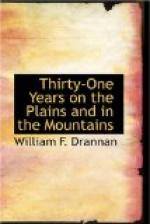The next morning we broke camp early, and about eleven o’clock came on to four emigrant wagons returning from Pike’s Peak. The Indians had stolen the horses.
There were sixteen men in the party and they had been there three days and had not been two miles away from camp. They made some kind of arrangement with the train we were with to haul their things to St. Joe, Missouri, and left their four wagons standing by the roadside.
We had no more trouble while with this train, and everything moved along nicely.
When we were near Pawnee Rock, where we were to leave the train, and some twenty miles from the Kiowa village, I met about thirty Kiowa Indians going out to run the buffalo near there. Of course they all knew me, and after shaking hands we stopped to await the arrival of the train. When it came in sight and the men saw the Indians all around me they thought I had been taken prisoner. They at once corralled their wagons for a fight, and all the talking Jim Bridger could do would not make them believe otherwise, until he rode out to where we were. When he told me this I thought to have a little sport with the boys before leaving the train, and I proposed to Jim that we start to the wagons with the Indians riding on either side of us, so as to make it appear they had taken both of us prisoner. But Jim thought it would not do, as they were so excited they would shoot at our Indians before we were near the wagons. So we rode to the train and told the emigrants that these Indians would not molest them, and that they were my friends.
When I told the Indians the cause of their corralling their wagons, they all had a hearty laugh and called the men squaws. The Kiowas said that their people would be glad to see us at their village, and that they had plenty of robes to trade for beads, rings and blankets. So here we bade the emigrants good-bye, they keeping the Sante Fe trail east, while we turned due south, and in company with the thirty Kiowas, rode that evening to their own village. Chief Blackbird met us at the outer edge of the village and invited us to his wick-i-up. We told him that we had come to trade with his people, and that in four days we would be ready for business.
Jim Bridger and I had talked the matter over concerning this tribe and the Sioux, for we well knew that if they and the Sioux were on friendly terms we would get home safe, if not, we would have a hard time of it.
I proposed to Jim that we make Blackbird a present of something, and while he was in the best of humor I would ask him the question. Jim thought it a capital idea, and before supper I went to our cargo and got three rings and three strings of beads. After supper I gave one string of beads and one ring to Blackbird, one to his wife and one to his eldest daughter, who was about grown. We then sat down and had a social smoke and a friendly chat. By this time Blackbird was beginning to think I was a pretty good fellow, so I asked him if the Sioux were good Indians. He said: “Yes, the Sioux are my friends.”




